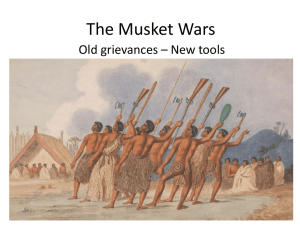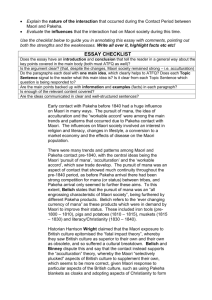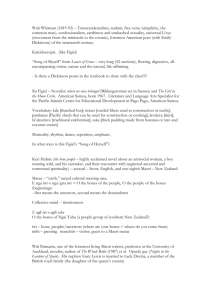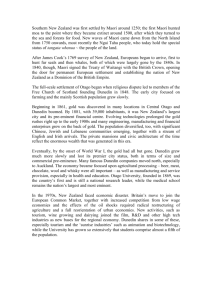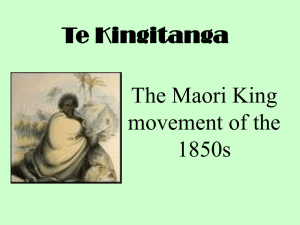`Pakeha`, Its Origin and Meaning
advertisement
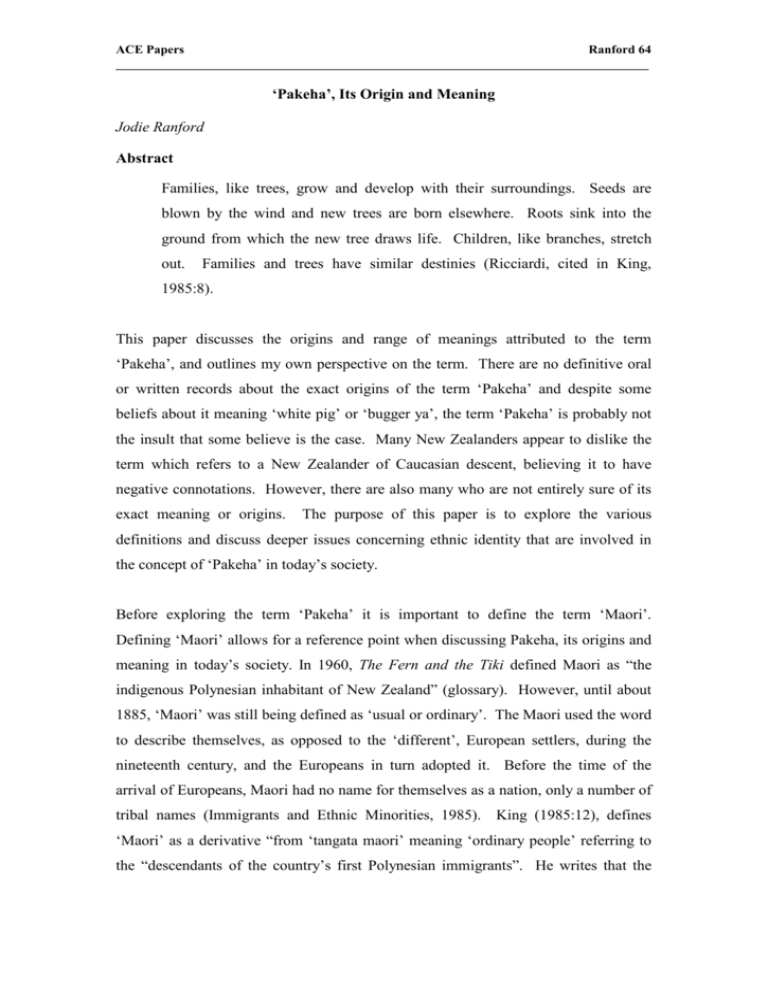
ACE Papers Ranford 64 __________________________________________________________________________________ ‘Pakeha’, Its Origin and Meaning Jodie Ranford Abstract Families, like trees, grow and develop with their surroundings. Seeds are blown by the wind and new trees are born elsewhere. Roots sink into the ground from which the new tree draws life. Children, like branches, stretch out. Families and trees have similar destinies (Ricciardi, cited in King, 1985:8). This paper discusses the origins and range of meanings attributed to the term ‘Pakeha’, and outlines my own perspective on the term. There are no definitive oral or written records about the exact origins of the term ‘Pakeha’ and despite some beliefs about it meaning ‘white pig’ or ‘bugger ya’, the term ‘Pakeha’ is probably not the insult that some believe is the case. Many New Zealanders appear to dislike the term which refers to a New Zealander of Caucasian descent, believing it to have negative connotations. However, there are also many who are not entirely sure of its exact meaning or origins. The purpose of this paper is to explore the various definitions and discuss deeper issues concerning ethnic identity that are involved in the concept of ‘Pakeha’ in today’s society. Before exploring the term ‘Pakeha’ it is important to define the term ‘Maori’. Defining ‘Maori’ allows for a reference point when discussing Pakeha, its origins and meaning in today’s society. In 1960, The Fern and the Tiki defined Maori as “the indigenous Polynesian inhabitant of New Zealand” (glossary). However, until about 1885, ‘Maori’ was still being defined as ‘usual or ordinary’. The Maori used the word to describe themselves, as opposed to the ‘different’, European settlers, during the nineteenth century, and the Europeans in turn adopted it. Before the time of the arrival of Europeans, Maori had no name for themselves as a nation, only a number of tribal names (Immigrants and Ethnic Minorities, 1985). King (1985:12), defines ‘Maori’ as a derivative “from ‘tangata maori’ meaning ‘ordinary people’ referring to the “descendants of the country’s first Polynesian immigrants”. He writes that the 65 Ranford ACE Papers ___________________________________________________________________________________________ term “Maori’ relates closely to ‘tangata whenua’: people of the land; but with connotations of ‘those who were here first’ and ‘host people’” (King, 1985:109). The English – Maori: Maori English Dictionary (Biggs, 1990), defines ‘Maori’ as “native, indigenous, ordinary”. Kiwi Words and Phrases (Campbell, 1999), defines ‘Maori’ as “indigenous people of New Zealand”. ‘Maori’ itself is not the primary term we (the Maori) use to describe ourselves (the Maori). We were, and are, a tribal peoples, we describe ourselves according to our tribal membership, rather than as a Maori. I am Maori only in relation to Pakeha. Maori means ‘normal’, i.e. in relation to Pakeha, ‘I am Maori’ (Himona. R, 1999). These definitions indicate that ‘Maori’ was adopted initially to enable a linguistic differentiation between the indigenous peoples of Aotearoa and the early European settlers, the Maori and the other. The definition of ‘Maori’ does not appear to have changed over time. However, the definition of the other, or ‘Pakeha’ has altered to some extent. Pakeha is in common usage, but many have difficulty in defining its meaning. From early records it is clear that the term was used in New Zealand before 1815 to mean ‘white person’. Initially a Pakeha was that person who came from England, and settled or worked in New Zealand. With time, Pakeha was the fair-skinned person who was born in New Zealand. Later the term was even more general. It was applied to all fair-skinned people in New Zealand, “no matter what their ancestry or place of birth” (Immigration Division, Department of Labour, 1985). By 1960, Pakeha was defined as “a person in New Zealand of predominantly European Ancestry” (Ausubel, 1960). The English – Maori: Maori – English Dictionary (Biggs, 1990), defines Pakeha as ‘white (person)’. Kiwi Words and Phrases (Campbell, 1999), defines Pakeha as a ‘non-maori person’. Mary-Ellen O’Connor defines Pakeha as ‘the dominant white race in New Zealand’. This would cover anybody of Anglo-Celtic origin (England, Scotland, Ireland, and Wales) and, as the integrated, Northern Europeans (Scandinavians, Germans, and Dutch), white Americans, Canadians and South Africans’ (O’Connor, 1990). By 1985 a significant development occurs with the definition when King (1985:12), defines Pakeha as “denoting non-Maori New Zealanders”. There is nothing in the definition referring to colour. It is merely all those people who are of non-maori ACE Papers Ranford 66 __________________________________________________________________________________ descent. King’s definition of Pakeha is given weight when we define the term Maori as ‘normal’, that is to say that, in relation to Pakeha, I am Maori. It is merely the means by which the peoples of Aotearoa differentiate between the indigenous peoples and more recent arrivals, or the Maori and the other. There appears to be two emerging uses of the term. One approach continues the references to those with white skin colour while the more inclusive refers to all those who are non-maori appears to be gaining currency. My own definition of ‘Pakeha’ is influenced by Ross Himona’s definition. It just means a New Zealander of non-Maori and non-Polynesian heritage. He considers that ‘Pakeha’ is most used to describe white non-Maori, as they were the original colonists, but it can apply equally to Asian, etc. This definition of ‘Pakeha’ is the most expansive that I have found. It gives the term Pakeha a more inclusive and less pejorative tone. Although the term ‘Pakeha’ is sometimes understood perjoratively to mean ‘long pig’ and ‘white pig’, this is not the case. Many early missionaries and government officials spoke Maori reasonably well using ‘Pakeha’ to describe themselves. Given the politics of the 1860s it is unlikely that such Pakeha would have used the word themselves in a derogatory sense. (What does ‘Pakeha’ mean?, 1999, http: //www.jgeorge.com/ pakeha.htms). It has been argued that the term ‘Pakeha’ is derived from ‘pa –kea’, a long nosed bird that was often found in the pa. If this is compounded from indigenous Maori words then any attempt to analyse it must take into account Maori grammar and phonology. Pa-kea fails on both criteria. Pa-kea, pronounced paa-kea, has only one of the long vowels found in Pakeha, pronounced paakehaa (Biggs, 1988). In 1894 Hoani Nahe (Biggs, 1988), suggested that ‘Pakeha’ could be an abbreviation of ‘paakehakeha’, gods of the ocean who had the forms of fish and man. It is said that Nahe’s version was in response to Bishop W.L. Williams’ comment that ‘Pakeha’ seemed to be an abbreviation of pakepakeha. These creatures are mischievous, mythical, human-like beings, with fair skin and hair who lived deep in the forest, coming out only at night (Biggs, 1988). This theory is supported firstly by the idea 67 Ranford ACE Papers ___________________________________________________________________________________________ that white people, like the paakehakeha, came from the sea, and secondly because the word ‘paakehakeha’ contains a reduplication of the Maori word ‘keha’ meaning ‘pale’ (Biggs, 1988). However, paakehakeha, like pa-kea, has only one of the long vowels that can be found in ‘pakeha’, pronounced paakehaa. The most likely derivation seems to be from ‘pakepakeha’ (Goerge, 1999). The derivation of ‘Pakeha’ from ‘pakepakeha’ is given added weight when we consider that the first term used to describe Cook and his crew was ‘tipua’ or ‘tupua’, a goblin or a supernatural object of terror (George, 1999). The ‘pakepakeha’ are also linked to ‘patupaiarehe’ by their fair skin and hair. The ‘patupaiarehe’ had fair skin and beautiful voices, and gave people the secret of fishing with nets. These creatures possess canoes made of reeds, which can change magically into sailing vessels. The ‘patupaiarehe’ can also be linked to Nahe’s version of Pakeha as an abbreviation of ‘paakehakeha’, gods of the ocean who had the forms of fish and man (Biggs, 1988). It appears that the origins of the term ‘Pakeha’ are as numerous as are its meaning. I have been unable to find records, either written or oral, that can provide a single definition origin. This places the responsibility on individuals to draw conclusions about the origins of the word ‘Pakeha’. I accept the derivation of ‘Pakeha’ from ‘pakepakeha’ because it establishes a clear whakapapa, or genealogy of the term ‘pakeha’. Paakehakeha (gods of the ocean who had the forms of fish and man) Patupaiarehe (beings with fair skin and hair who gave people the secret of fishing with nets) Pakepakeha (mythical, human like being, with fair skin and hair who possessed canoes made of reeds which changed magically into sailing vessels) ACE Papers Ranford 68 __________________________________________________________________________________ Pakeha (originally referring to the early European settlers of New Zealand) These clear linkages give a poetic ‘truth’ to the term ‘pakeha’, each version associating ‘Pakeha’ with the ocean, which is after all, how immigrants have arrived in Aotearoa from Cook’s first voyage to present day. The term ‘Pakeha’ and its changes through time enables us to form an opinion about whether or not the Pakeha people are an ethnicity. Is any non-Maori person currently in New Zealand a Pakeha? If ethnic identification rests with the individual, it is a fluid concept and means that an individual can identify him or herself with an ethnic group of his or her own choosing. This involves self-classification. An example of this might be that I am really Pakeha but choose to be identified as a Maori, or Maori but decide to present myself as Pakeha. I alone decide what I am. However, if ethnicity is a category imposed by others in recognition of physical appearance and a shared history and culture, then can Pakeha really be a self classification. What is ethnicity? The Concise Oxford Dictionary defines ethnicity as “n.; of a specified racial, linguistic, etc., group”. An ethnic group is described in broad terms in Immigrants and Ethnic Minorities (Department of Labour, 1985), as “people who are aware that they share a common ancestry, culture and history and who maintain their cultural identity”. This definition complicates the notion that ethnicity is selfattributable. Can Pakeha, that is any person of non-Maori or non-Polynesian heritage, really be called an ethnicity? The term would then include a person of Asian heritage, and a person of Greek heritage, and so on. These people do not share a common ancestry, culture, nor history. Their physical differences also contribute to the different ethnic categorisation. It is therefore my belief that the term ‘Pakeha’ does not identify an ethnic group. Both ‘Pakeha’ and ‘Maori’ terms instead offer us a way to differentiate between the historical origins of our settlers, the Polynesian and European. ‘In the beginning we were all immigrants to these islands, our ancestors boat people who arrived by waka, ship or airplane. The ingredients of our indigenous cultures too were imported: the East Polynesian language that became Maori, and English; papatuanuku, and the 69 Ranford ACE Papers ___________________________________________________________________________________________ Bible; Maui and Tane Mahuta, Robin Hood and Horatio Nelson; the kumara and the kiwifruit. “An understanding of our respective origins is the beginning of our present selves” (King, 1999:11). Is it not true that we “become indigenous to New Zealand at the point where our focus of identity and commitment shifts to New Zealand, and away from our countries and cultures of origin” (King, 1999:235). It is certainly true that in a country that has been inhabited for little more than one thousand years everyone is an immigrant or a descendant of immigrants. In conclusion, this paper has examined the meaning of ‘Pakeha’ in today’s society. Through this research and discussion I have been able to come to my own understanding and perspective on the term ‘Pakeha’. The term itself is derived from ‘pakepakeha’, a mythical human-like being with fair skin and hair. Originally the Pakeha were the early European settlers, however, today ‘Pakeha’ is used to describe any peoples of non-Maori or non-Polynesian heritage. Pakeha is not an ethnicity but rather a way to differentiate between the historical origins of our settlers, the Polynesians and the Europeans, the Maori and the other. We have to remember that we are all citizens of Aotearoa, we have no other home, no other turangawaewae (King, 1985:177). Acknowledgements I would like to acknowledge the help and information received from Ross Himona while researching this topic. Bionote Jodie Ranford is a primary graduate student at the Auckland College of Education. This topic gained her interest during a lecture at the College in which students appeared to be unsure about Pakeha New Zealanders. ACE Papers Ranford 70 __________________________________________________________________________________ References Ausubel, D. (1960). The Fern and the Tiki – An American view of New Zealand national character, social attitudes, and race relations. London: Angus & Robertson Ltd. Bohan, E. (1997). New Zealand – The story so far : A short history. Auckland.: Harper Collins Biggs, B. (1990). English – Maori : Maori – English Dictionary. Auckland: University Press. Biggs, B. (1988). The word ‘Pakeha’ : where it comes from, what it means. Te Iwi O Aotearoa, October. King, M. (1985). Being Pakeha. Auckland: Hodder & Stoughton Ltd. King, M. (1999). Being Pakeha Now. Auckland: Penguin Books. O’Connor, M. (1990). An Immigrant Nation. Auckland: Heineman Education. Department of Labour (1985). Immigrants and Ethnic Minorities – What Words Should I Use; Wellington: Department of Labour The Journey to Aotearoa, 24 September 1999, http://ourworld.compuserve.com/homepages/rhimona/maoriara.html Kiwi Words and Phrases, 24 September 1999, http://www.chemistry.co.nz/kiwi.htm What does “Pakeha” mean?, 25 September 1999, http://www.jgeorge.com/pakeha.html The Maori – Lonely Planet – Maori, 24 September 1999, http://www.lonelyplanet.com.au/dest/aust/maori.htm
